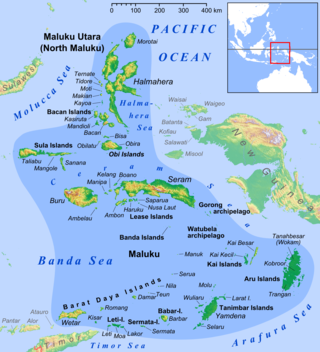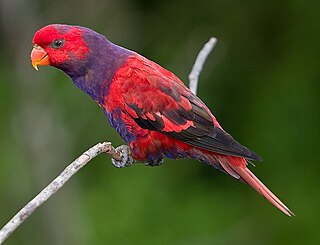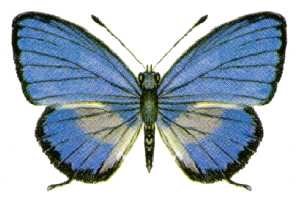
The Maluku Islands or the Moluccas are an archipelago in the east of Indonesia. Tectonically they are located on the Halmahera Plate within the Molucca Sea Collision Zone. Geographically they are located east of Sulawesi, west of New Guinea, and north and east of Timor. Lying within Wallacea, the Maluku Islands have been considered as a geographical and cultural intersection of Asia and Oceania.

North Maluku is a province of Indonesia. It covers the northern part of the Maluku Islands, bordering the Pacific Ocean to the north, the Halmahera Sea to the east, the Molucca Sea to the west, and the Seram Sea to the south. The provincial capital is Sofifi on the largest island of Halmahera, while the largest city is the island city of Ternate. The population of North Maluku was 1,038,087 in the 2010 census, making it one of the least-populous provinces in Indonesia, but by the 2020 Census the population had risen to 1,282,937, and the official estimate as at mid 2021 was 1,299,177.

Seram is the largest and main island of Maluku province of Indonesia, despite Ambon Island's historical importance. It is located just north of the smaller Ambon Island and a few other adjacent islands, such as Saparua, Haruku, Nusa Laut and the Banda Islands.

Wallacea is a biogeographical designation for a group of mainly Indonesian islands separated by deep-water straits from the Asian and Australian continental shelves. Wallacea includes Sulawesi, the largest island in the group, as well as Lombok, Sumbawa, Flores, Sumba, Timor, Halmahera, Buru, Seram, and many smaller islands. The islands of Wallacea lie between the Sunda Shelf to the west, and the Sahul Shelf including Australia and New Guinea to the south and east. The total land area of Wallacea is 347,000 km2 (134,000 sq mi).

The Obi Islands are a group of 42 islands in the Indonesian province of North Maluku, north of Buru and Ceram, and south of Halmahera. With a total area of 3,048.08 km2, they had a population of 41,455 at the 2010 Census and 50,760 at the 2020 Census. The official estimate as at mid 2021 was 51,510.

The hair-crested drongo is an Asian bird of the family Dicruridae. This species was formerly considered conspecific with Dicrurus bracteatus, for which the name "spangled drongo" – formerly used for both – is now usually reserved. Some authorities include the Sumatran drongo in D. hottentottus as subspecies.

Apaturina is a monotypic genus of butterflies in the family Nymphalidae. Its sole species is Apaturina erminea, the turquoise emperor.
The dusky mosaic-tailed rat is a species of rodent in the family Muridae.

Melomys is a genus of rodents in the family Muridae. Members of this genus live in the wet habitats of northern Australia, New Guinea, Torres Strait Islands and islands of the Indonesian archipelago.

The glossy swiftlet is a species of swift in the family Apodidae. It is found on the Indonesian island of Sulawesi and eastwards to New Guinea, the Bismarck Archipelago and the Solomon Islands.

The violet-necked lory is a species of parrot in the family Psittaculidae. It is endemic to Indonesia, where it is found in the northern Maluku Islands and west Papuan islands. Its natural habitats are tropical moist lowland forests and tropical mangrove forests.

Rothschild's cuscus, also called the Obi Island cuscus, is a species of marsupial in the family Phalangeridae. It is endemic to the islands of Obi, Bisa and Obilatu in the Obi Islands of Maluku province, Indonesia.
Continental crustal fragments, partly synonymous with microcontinents, are pieces of continents that have broken off from main continental masses to form distinct islands that are often several hundred kilometers from their place of origin.

The black-chinned whistler is a species of bird in the family Pachycephalidae, endemic to Halmahera and adjacent smaller islands in North Maluku in Indonesia.
South Halmahera Regency is a regency of North Maluku Province, Indonesia. It lies partly on Halmahera Island and partly on smaller islands to the west and south of Halmahera. It covers a land area of 8,779.320 km2, and at the 2010 Census it had a population of 198,911 people, while the 2020 Census showed that this had risen to 248,395 and the official estimate in mid 2021 was 251,690. The capital lies at the town of Labuha on Bacan Island.

Nacaduba cyanea, the tailed green-banded line-blue, is a species of butterfly in the family Lycaenidae, and formerly considered a member of the genus Danis. It is found in the Indonesia, Papua New Guinea, the Solomon Islands and Australia (Queensland).
Halmaheramys bokimekot, the spiny Boki Mekot rat, is a rodent found on the island of Halmahera in the Molucca archipelago, whose discovery was announced in 2013. This is the only locality where this particular species has been found. H. bokimekot was confirmed as a new species through probabilistic methodologies applied to morphological and molecular data.
Halmaheramys is a genus of rodent in the family Muridae endemic to the Moluccas, Indonesia.

The Lesser Sunda Islands or nowadays known as Nusa Tenggara Islands are an archipelago in Maritime Southeast Asia, north of Australia. Together with the Greater Sunda Islands to the west they make up the Sunda Islands. The islands are part of a volcanic arc, the Sunda Arc, formed by subduction along the Sunda Trench in the Java Sea. A bit more than 20 million people live on the islands. Etymologically, Nusa Tenggara means "Southeast Islands" from the words of nusa which means 'island' from Old Javanese language and tenggara means 'southeast'.












